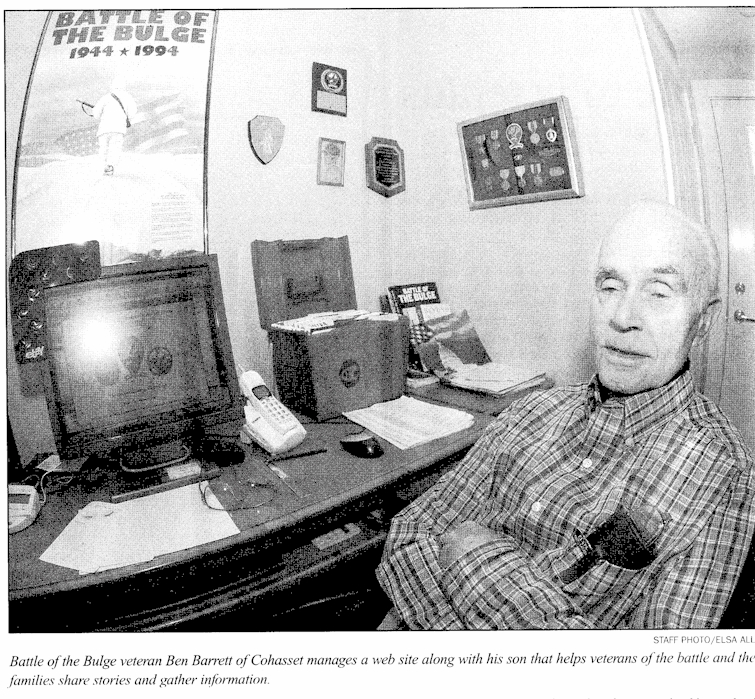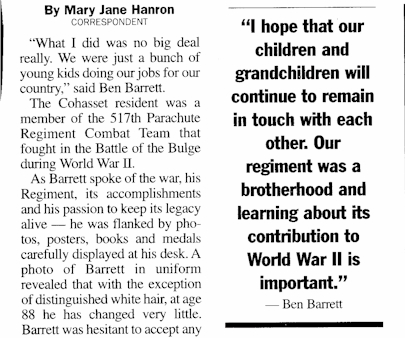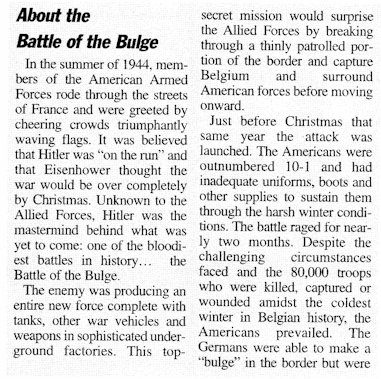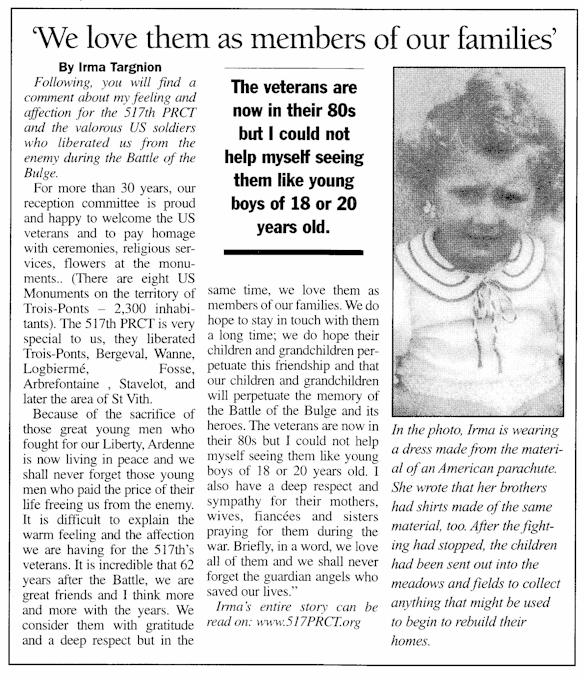


 |
| "What I did was no big deal really. We were just a bunch of young kids doing
our jobs for our country," said Ben Barrett. The Cohasset resident was a member of the 517th Parachute Regiment Combat Team that fought in the Battle of the Bulge during World War II. As Barrett spoke of the war, his Regiment, its accomplishments and his passion to keep its legacy alive - he was flanked by photos, posters, books and medals carefully displayed at his desk. A photo of Barrett in uniform revealed that with the exception of distinguished white hair, at age 88 he has changed very little. Barrett was hesitant to accept any personal credit for what had been achieved during that infamous conflict, but the photos, memorabilia and written accounts tell a story of remarkable courage, brotherhood and patriotism. Following World War II, Barrett went to Boston University on the GI Bill. It was there that he met Fran, who had been an Army nurse, and married her on Veterans Day in 1949. Despite the patriotism that had been demonstrated by the couple via their military service, the wedding date had no symbolic message attached. "It was a Saturday, we both had the day off and the church was available," Barrett explained. "I missed a big football game that day, too because of it!" The couple settled north of Boston in Saugus and started their family. Barrett, despite his war wounds was able to carry on with life and work and raising his six children. Though enjoying ordinary life in the country for which he had fought and sacrificed, he carried with him memories of the sights and sounds of war and suffering, especially those accumulated during the legendary battle in the cold and snowy Belgian countryside. The Barretts moved to the town two years ago to be near their daughter, Joanne and grandson, Eric Weinstein. When his children were growing up, Barrett never talked about the war, said Joanne. "It is only as adults that we learned so much about his involvement in the Battle of the Bulge," she said. "At the time I thought, íWhy talk about it? I canít explain it. Who would understand it?í" Barrett said. "You couldnít understand it unless you had been there. I donít understand it myself. I was so young and I remember it all but I donít remember being very scared. "We were like brothers though, and we would have ípactsí with our fellow soldiers that if something happened to one, the other would be sure to be in touch with the family when we returned home." As a young man in the frigid forests of Ardennes, Belgium, Barrett surely was unaware how much he would contribute to this code of honor more than half-a-century later. For Christmas in 2000 his children gave him a computer. His son, Bob, created a website for him telling the story of his life and honoring his Regiment. The site: www.517PRCT.org has grown to be a source for veterans, their families and friends to remain in touch, connect with people who may have known a loved one, research facts about soldiers and their families and learn about the Battle of the Bulge. In addition to helping people close chapters and begin new ones in their lives by finding answers to questions that have been unsolved for years, Barrett also has united many grateful residents of Europe with the veterans who fought for their freedom. The European citizens, who enjoy freedom today as a result of the 517th, are able to visit and communicate via this website on a daily basis with their American friends and their families. Among these is a group of citizens from Belgium that greet the American troops when they visit. This committee continues to see that the soldiers are remembered and honored for liberating them from the Germans. Irma Targnion was four years old during the Battle of the Bulge and has very clear recollections of that time. She has written her story and it appears on the 517th website. The Mariner contacted her for a comment about this story. She also sent a photo of herself at that time in which she is wearing a dress made from material of a United States parachute. ( See related story.) 50th anniversary For the 50th anniversary of the Battle, Barrett returned to Europe with his wife and daughter. He described the reception of the citizens of Belgium to the US paratroopers and how different it is from that in the United States today. "We went into a store to buy a camera," he said. "As soon as they found out I was one of the US paratroopers, they gave it to me for free. Everywhere we went, people would say íthank you.í Small children learn all about the War and the Battle of the Bulge in school. They are grateful for their freedom and they love Americans. Here in this country, itís become just another day off...a day to go shopping. "That was when a war brought the country together," he continued. "Everyone was part of the war effort. Of course, that was when women went to work, factories manufactured supplies for the troops and any city you went to you saw about 80 percent of the people walking around in uniform. There were terrible conditions then, too. We didnít have the right clothing for the cold winter that there was, the equipment froze and thousands died. There were times we had to walk by our own injured troops and keep going. Those were our orders. What people donít understand is that these decisions have to be made in split seconds. Sometimes in battle people die so thousands more wonít. Of course it was terrible. It was war. I still recall the smell of the battlefield, the brush and the tall grass. Sometimes there was so much fire, there was nothing but red in the sky." Barrettís journey to one of biggest battles in American history was not a typical one. Upon graduating from high school in 1937, he joined the Civilian Conservation Corps where he earned $30 a month. "I got to keep $5 and the rest was sent home to my family," he explained. "Roosevelt created the program. It was during the Depression and it was a good way to keep guys like me busy and out of trouble!" He tried to enlist in the service in 1940 in New Hampshire but was rejected because of a heart murmur. A while later, he learned he could try to enlist in Maine and this time was successful. "After Pearl Harbor, they were looking for paratroopers," Barrett recalled. He then went to Fort Benning, Ga. for training. After earning his paratrooper wings, he volunteered to go overseas for combat duty and eventually joined the 517th Parachute Regiment Combat Team. When the Germans began their invasion, they chose an area of the border that was lightly patrolled. Referring to the surprise attack of the Battle of the Bulge, he said, "We had a radio and it was very hard to hear what was being said but we knew something was happening. When we headed out, we drove by trucks. It was a cold snowy winter and we had practically no shelter. When we were engaged in the battle, we knew the Germans outnumbered us. When you are the infantry, there is nothing between you and the enemy." Later in the Battle, Barrett was wounded and eventually returned to the United States on a hospital ship. His long trip home included an "ambulance" ride being strapped to a jeep. "When there would be incoming fire, the driverís orders were to stop the truck, leave us and take cover. Of course if something happened to him, nothing would be accomplished. I was already no good. I remember watching the shells light up the sky over my head. It was beyond belief." The 517th had been part of the defeat of the Germans in the Battle of the Bulge in which there were more than 80,000 American casualties in fewer than two months. Shares stories The website maintained by Barrett and his son tells countless stories of this Battle and the brave troops who fought in it. Hours studying these accounts only begin to capture the essence of the significance of this incredible time in history. The valor, pride and loyalty of these troops and their families are evident in their words and recollections. "There is a whole new generation becoming interested in learning about the military," Barrett said. "As people go off to fight in war today, their families and friends look for information on the internet about the armed forces, history, locating news of loved ones and others going through similar experiences. Thatís how they find us. There are so few people left now from World War II. I hope that our children and grandchildren will continue to remain in touch with each other. Our regiment was a brotherhood and learning about its contribution to World War II is important." Curiosity about relatives or stories without endings that might relate to this time in history can be researched and explored. Barrett encourages others to ask questions, write letters and emails and pay attention to old notes or journals that might be discovered in attics or basements. "If someone wants to try to locate a person or learn what happened in a particular situation during the Battle, they should send an email along on the website. We can share the information and see what others know. I have seen people learn that they live in a town near the person who holds the answer to their question." The 517th Parachute Regimental Combat Team was together from 1943-1945. It was deactivated in 1945, but its members have remained in touch with each other and attend reunions regularly. Barrett is overseeing the next National Reunion which will be held in Washington D.C. June 27 to July 2, 2007. Registration information is on the website and anyone interested is invited to be part of this event. "We decided to have it in June because many people have grandchildren they would like to take and combine it with a vacation," said Barrett. "It isnít necessary to attend the meetings for the 517th. Some people come along with us and go sightseeing while taking advantage of our group rates and activities. Of course you can be in Washington, D.C. a month and not see everything. But we thought it might be the last opportunity for many of the veterans to see the World War II Memorial. We hope lots of relatives, friends and neighbors will join us on the trip." Another popular feature of Barrettís website is his newsletter, "Mail Call." Sent by email, he writes and sends recent news including bits of communication he has received, reunions that are happening, personal updates from members and other topics of interest. "Mail Call" is sent almost daily to more than 350 soldiers, family, and friends of the 517th in the United States, France and Belgium. This communiquť is one of the most popular features of the site, which is recognized by many veteran organizations as one of the most informative military sites on the internet. "Itís nothing fancy," says Barrett, "but there are lots of people who look forward to it. One guy told me recently that when he does his reading, he sits down with the Washington Post and íMail Call.í Another guy I know doesnít have a computer but receives the newsletter from his son. The son has said that when he used to go to visit his Dad, he would be asked how he was and how things were going. Now his Dad says, íDid you bring me Mail Callí?" Barrett recently gave a presentation at a breakfast group in Hull about the "Battle of the Bulge." He also is participating in a program with the Braintree schools in which students must interview a veteran from a war in which the United States was engaged. The students are to research and study the war during the year and the veterans will be invited back on Memorial Day 2007 for a ceremony. The recipient of a Bronze Star, Purple Heart and eight other medals, Barrett insisted his service was nothing more than fulfilling his duty to his country. "I was no hero but I served with a regiment of heroes; the 517th Regimental Combat Team. The real heroes never came home." |


Cohasset (MA) Mariner
By Mary Jane Hanron/ Correspondent
Friday, November 10, 2006
for Veteran's Day - Nov 11, 2006